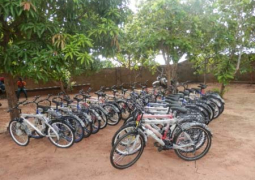
Ousman
Jammeh, project manager of Bio-fortification, an EU-funded project and
implemented by United Purpose (formerly known as Concern Universal), has
lamented that The Gambia has experienced an alarming increase in malnutrition.
He
said agriculture accounts for 23% of GDP and employs 75% of the rural
population yet food security is an increasing problem with 285,000 people at
risk of food insecurity (FAO 2014).
He
disclosed this while delivering a speech during the national launching of the
Bio-fortification project held recently.
He
added that cereal production dropped by 23% overall from 2013 to 2014 as a
result of the environmental challenges and early millet production has declined
by 14% since 2009 (NASS 2014).
Mr
Jammeh said food and nutrition security are a challenge in all the five regions
of the country, adding that CRR North and South and URR were recently
classified by NaNA as entering the red zone indicating an emergency situation.
According
to him, lack of nutritious food and knowledge on nutrition is a further
challenge, particularly for mothers, which results into critical deficiencies
for children.
He
stated that malnutrition is a problem throughout the country but varies in
different local government areas.
Mr
Jammeh thanked the European Union for their support in this direction as well
as United Purpose for crafting the proposal and the government of The Gambia
for the enabling environment.
He
indicated that the project which is for four-years is being funded by the
European Union to the tune of €2.6 million.
The
overall objective is to reduce under nutrition and poverty of vulnerable
populations, especially women and children in The Gambia by strengthening
sustainable access to and consumption of fortified foods.
He
also explained that “Baluu Tim - Maringo” Project is aimed at systemic and
sustainable changes that would provide better health and nutrition based on
value chain approach to ensure maximum sustainability.
“A
strong communication campaign is required to drive behaviour and market demand
to ensure that uptake of fortified foods link to better production practices
and nutrition health knowledge. There will be a communication and ICT component
in the project to reach population at scale.”
The
overall objective is to improve the nutritional status of women and children in
The Gambia through the adoption of bio fortified foods.



